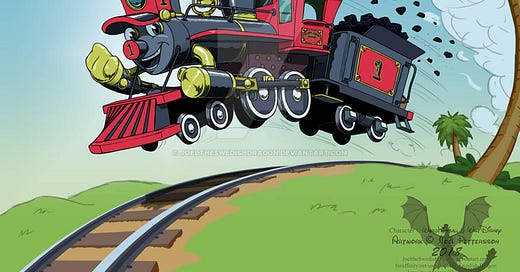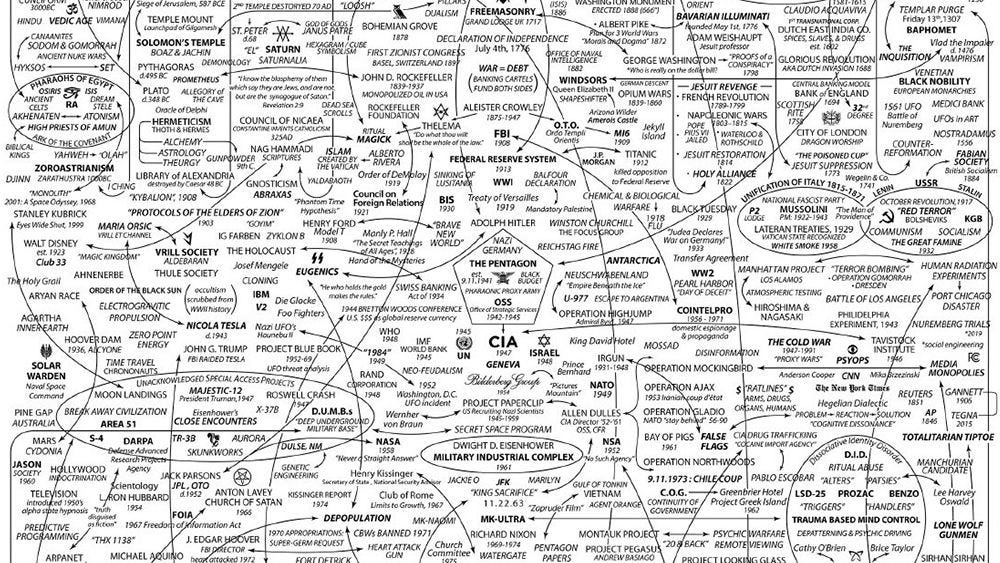We seem to have entered an era of peak lunacy lately. Everyone and their mother insists on some increasingly baroque and over-arching explanation of what’s “really going on.”
Whether that’s NATOs secret plans to take over Europe via instigating a war against innocent Russia (with master strategist Hunter Biden’s help),
to Fauci in cahoots with Pfizer and Gates to brain-damage and microchip the world,
to old chestnuts like the Jews controlling Hollywood or the stock exchange,
or the CCP hollowing out democracy with Fentanyl and TikTok (more plausible)
to sinister ideas involving children’s adrenochrome and underground caverns beneath LA or New York
to a faked eco-crisis that’s simply a ruse to get us locked down in 15 minute cities and deliver us to a Davos controlled “you’ll own nothing and be happy” dystopia.
We’ve never had a more vibrant buffet of crazy conspiracies to sample from!
The MAGA/Brexit era plus Covid lockdowns sent us over the edge, to be sure, but we’re not exactly regaining our footing now.
But rather than going down all of these rabbit holes, I’d like to take the time today to explore why we dig those reality tunnels in the first place. What is it that our Spidey Senses are hinting at, that we’re not quite getting at?
First though, a simple bit of mental-hygiene house cleaning:
If you are persuaded/seduced by any one of these Grand Explanations, wherein a tiny group of people secretively pull all the strings with supremely effective yet tantalizingly invisible coordination…
Ask yourself:
Does that include all the incredibly rich, armed to the teeth narcos in Mexico and Central America? Are they in cahoots too?
How ‘bout the Chinese Tongs?
The Japanese Yakuza?
The Russian/Sicilian/Kazakh Mafias?
Or just good ol’ fashioned nation states with their entrenched self-interests and historical grudges?
Or the multi-national companies who rely on peace and stability to profit?
Or the military industrial complex who doesn’t?
You get the point.
Singular solutions to complex problems are always wrong, no matter how soothing or satisfying they may appear at first glance.
The All Knowing Powers That Be are, at a minimum, fractured Balkanized, competing, conflicting confounding factions engaged in a multi-polar tug of war where no one is certain of any outcome.
#bestlaidplans
Case in point: Just this week in the New Yorker there was a fascinating bit about how the all knowing CIA is actually, quite often, totally clueless!
So clueless in fact, that Saddam Hussein assumed that his erstwhile U.S. allies (against Iran) knew exactly what he was planning for his invasion of Kuwait. When George H.W. Bush sent a friendly communique three days before the invasion, Saddam took it as a tacit thumbs up on the whole venture!
After all, the CIA was the Sauron’s Eye of the greatest empire in history. They had to be in on it!
Whoops.
(and that’s long before we got to yellow cake uranium and weapons of mass destruction)
And yet, and yet!
There is an unshakeable sense, held by an increasing majority of people, that something is off.
That we’re getting herded into a cattle chute towards our own undoing. And that understandably leaves us a little freaked out, and yearning to jump the fence and run like hell towards the open range.
For sure, there are the classic Us vs. Them narratives that have always tempted us.
From the Anti-Masonic freakouts of the 18th and 19th century, to the Protocols of the Elders of Zion rants of the early 20th century, to the so-old-its-new-again raving against the New World Order of the John Birchers in the 1950s…it’s always satisfying and cathartic to engage in a bit of good ol’ fashioned Gerardian scapegoating!
It’s not Us. IT’S THEM!!!
But underneath that is something more primal still. A sense that, no matter what we think, feel or do, that the outcome is somehow already determined, and that we’re slip-sliding towards our own doom.
And it’s precisely that sense of relentless ratcheting against our own interest that sows the seed of our grandest conspiratorial story telling.
After all, if we can see enough to know that we’re heading off a cliff, but we keep getting forced close and closer to that edge, then whoever is goading us has to be so powerful (and sinister) that we’ve got to find them and root them out if we’re to survive.
But what if it’s less a who than a “what?”
And that “what” might simply be described as Obligate Adaptations.
All that term means is an adaptation that you’re obligated to make, (or else).
You don’t have to make an obligated adaptation, but if you don’t, you will inevitably get swept into the dustbin of history.
A few examples:
When our homo erectus ancestors decided to clamber down from their jungle paradise two million years ago, they might have asked their chimp and bonobo cousins, “hey! we’re thinking about trying this whole bipedalism thing, and checking out that savannah over yonder. Wanna come?”
“Nah,” said a lazy bonobo diddling her friend. “we’re good, reckon we’re gonna stay here and eat mangos. Besides, why would you risk everything on those hot dusty plains. Nothing but lions and crocs out that way!”
We put our cousins in zoos now.
Or how about those hunter gatherers at the end of the last ice age eleven thousand years ago?
When one group pitched up and said “you know, the weather seems to be stabilizing, how ‘bout, instead of all of this incessant roaming around, we post up here for a bit, sow some of the seeds of things we like to eat, and try a little more farming and a little less gathering?”
“What?” asked one of their mobile tribemates (who’d just read an early draft of Yuval Harari’s Sapiens). “Why on earth would we give up our mobility, better nutrition, more egalitarian and gender-balanced society in favor of crowding, disease, bureaucracy, patriarchy and war? We’re gonna stay footloose and fancy free!”
And they weren’t wrong. About any of it. It’s just that their farming friends were able to support ten to a hundred times the number of people on a given patch of ground.
And their ability to store food increased their ability to grow their population, and raise armies. (which required expanding into neighbors’ territories)
So even if the hunter-gatherers had it right, they ended up on the wrong side of history. Overrun by armies of farmers.
And being on the wrong side of things, even if you’re certain of the rightness and goodness of your position, is going to feel like there’s sinister forces arrayed against you!
Obligate adaptation.
Adapt or die.
Same thing with a bunch of more current examples, from overfishing and overlogging the Commons (i.e. strip-mining oceans and forests–if we don’t someone else will) to the Green Revolution’s rush to industrial farming (which we can’t back off from now, without risking a population crash) to the race for nuclear weapons (good for politics, bad for humanity), to the move to globally integrated supply chains (better, faster, cheaper hollowing out local industry), to our current fatal attraction with Artificial Intelligence, we can’t seem to stop, even as we know we should.
To unpack just one of those examples from this list, consider the obligate adaptation of industrial farming vs. traditional subsistence farming. Traditional farming (including organic fertilizers and crop rotation) allows ongoing sustainability, but delivers lower yields. Industrial farming with synthetic fertilizers and pesticides and full production boosts yields but comes with costs.
Sri Lanka serves as a recent case study.
See this recent op-ed in NYT for a decent intro to some of the factors: Sri Lanka Collapsed First, but It Won’t Be the Last
After WWII, Sri Lanka, like many former colonies, got increasingly pulled into the World Bank/IMF global trade network. For a time, it worked swimmingly for most involved.
If they had resisted, they would’ve stayed mired in poverty and missed the great upswell of growth and prosperity sweeping the world.
"Stop farming for foods you need to eat, and start farming more high value exports like tea!" the World Bank encouraged. "We'll cover the transition with predatory debt service, and you can pay us back on the flipside once you make it big!"
"What about food to eat?" the Sri Lankan farmers reasonably asked.
"Ahh, yes, well, with all that money you're earning from tea exports, you can buy that food from other farmers in other countries even cheaper than you can grow it yourself!" #globalismFTW
And the population shot up accordingly. Tripling from 8 million folks in 1950 to almost 22 million today.
It's not talked about much in polite circles, but being a junkie is underrated.
If you can cop a lifetime stash of medical morphine and clean needles, you can be a high functioning poppy head for the rest of your days.
(Think “Comfortably Numb”, rather than Trainspotting)
Quitting's a bitch tho.
Same with weaning off petro-agriculture.
In 1950, the lands of Sri Lanka and the traditional techniques of subsistence farming supported about 8 million citizens.
In the 2020s when the country briefly tried to wean itself off chemical intensive farming, it did not go well. Many energy analysts reckon that eight million is probably closer to a sustainable steady-state for that landmass and climate than twenty two (given current farming methods, water, labor, etc).
Which means that in order to do the "right thing" for their people, their ecosystem and their future and wean off extractive, polluting industrial agriculture and exploitive markets, Sri Lankans are going to be faced with the profoundly "wrong thing" of prompting the possible starvation of millions of their own people.
That’s Obligate Adaptation in a nutshell. You don’t have to do it. But unwinding it (or avoiding it in the first place) is a bitch.
And it’s that sense of a seemingly orchestrated, relentless ratcheting-towards fore-ordained-conclusions that underpins much of our conspiratorial thinking.
There’s simply no way, (we conclude) that all of this could be happening, with such coordinated, inevitable outcomes if there weren’t an all powerful cabal steering us there!
#monsanto
Kinda makes sense.
Nor is it new.
We’ve been giving it all sorts of names—from the Tibetan notion of Hungry Ghosts, all mouths and no stomachs, forever consuming everything without ever being satisfied, to the Native American spirit of Wetiko (a similarly greedy, all consuming dark force) to the higher concept notions of Egregores (entities that we conjure into being that take on a life of their own) to Moloch (the dark and devouring force behind capitalism and all else) to actual personifications like the New World Order, or the Illuminati.
Once you look around and survey the meme-scape, you realize we’ve got all sorts of labels trying to put a finger on this deeper structural trend of Obligate Adaptation.
And it’s super weird.
Because at this point, a whole bunch of folks are screaming STOP! at the top of their lungs, and nothing seems to be stopping.
And since it’s increasingly clear that this relentless forward motion seems to be against our own interests, we conclude that it has to be in somebody else’s!
So what’s to be done?
Can we wisely and benevolently stop the mad rush to Artificial General Intelligence (that many of its architects think may well end terribly for us, but keep going full steam so at least they might call the shots if they get there first).
Can we tap the breaks on mindless consumer consumption, jet set travel, fossil fuel burn, digital narcissism, screens for teens, medical misery, processed foods, microplastics and forever chemicals and a gajillion other dumbass ideas that work against our own self-interest?
Or are we doomed to lurch over the cliff right in front of us, because no one thought to install an emergency brake on the Train of Progress?
I’ll admit, if you survey the historical record, it looks pretty bleak. Time and again, from indigenous tribes trying to resist colonialism, to traditional cultures trying to resist globalism to families trying to resist digital distractions, to silicon and nuclear arms races, it feels like if we can imagine it, we are somehow also powerless to stop it.
Except for one thing.
The ultimate “obligate adaptation” of all.
If we can’t figure out how to stop it. How to unite around a higher cause. We will all snuff it. Sooner than later.
Benjamin Franklin framed this nicely at the signing of the Declaration of Independence. “Gentleman, one thing I know, we must all hang together, or most assuredly we shall hang separately.”
That sentiment—of collective destruction or salvation, is just as true today.
If we fracture now, when we should be urgently uniting, if we dig in our heels and say, “I refuse to cooperate or acknowledge the shared humanity of those not like me until I get mine,” then we increase the likelihood that we all get hurt. Badly.
If we conclude that the regression into violent and paranoid win-lose tribalism as the planet strains to support eight billion humans is a catastrophically bad idea, then we must also conclude, as Muhammad advised, “The enemy of my enemy is my friend.”
At least for now. Maybe forever.
We will need to bury our respective hatchets and grudgingly agree to work together against the pressing threats to civilization, and even the survival of our species.
This does not and should not require universal consensus, nor can it wait for it. We only need to find the broadest expanse of our shared concerns, meet there in mutuality, and get to work.
At this point, it’s not even optional.
It’s our obligation.









There's a lot of important ideas packed in here. Obligate adaptation keeps making me think about "the tragedy of the commons." Whenever it's beneficial for an individual or group to use more of a common resource, and that common resource degrades from increased use. It's not the same thing, but there's a parallel. It's almost like obligate adaptation is a kind of "Tragedy of the Future Commons," where ruin is brought about sometime in the future by each party playing a strategy that they think will be necessary in games that haven't occurred yet. Maybe that's wrong. Thank you for this important thought-provoking piece Jamie.
Here's the thing about coming together: this work requires a reconciliation of old wounds, past harms, and appreciation for different realities, different priorities, different approaches for survival. What's required to hold this energy is stronger leadership. Liberatory leadership. The kind of leadership that teaches and expects sovereignty and agency within all beings. Many people are looking to women to take the helm but do not know or have interest in finding out what that requires. The major levers of change will be found in the interstitial spaces that allow adaptation of identity and mindset. Consent and boundaries are more important now than ever. We can welcome the shapeshifter inside all of us. Give permission to be destabilized. To shake and move without intellectual permission-giving. This is why it is such a good time to come out and be queer.